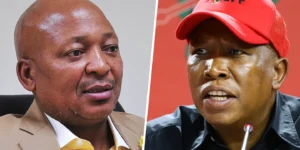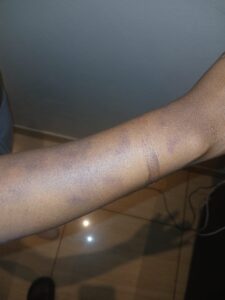By: Ambassador Carl ‘Mpangazitha’ Niehaus*
Recent reports from the police suggest that an inquest docket has been registered, and is under investigation in the matter involving comrade Tina Joemat-Pettersson’s death. Comrade Tina would be alive today if the ANC had not colluded with the racist DA to subject Public Protector Advocate Mkhwebane to an ill-fated and farcical impeachment process. An inquest is a judicial inquiry in common law jurisdictions, particularly one held to determine the cause of a person’s death. But the forensic scientific investigation has its inherent short-comings – it will not expose the treachery and betrayal by ANC comrades, and will never deal with the pangs of conscience of a dying dedicated revolutionary driven to extremes by corruption within an organization to which she dedicated her entire life.
It is highly disturbing that comrade Tina Joemat-Pettersson was a victim of the treachery and unconstitutional collusion between her own party, the ANC and the racist Democratic Alliance which represents the odious white monopoly capital. The cause of her untimely death can be laid squarely on the shoulders of white-owned media, and stratcom journalists, who have single-mindedly parroted and peddled the false narrative portraying our Public Protector, Advocate Mkhwebane, as incompetent deserving to be removed from office at all costs. Above all, comrade Joemat-Petterson was failed by our politicised judiciary which she accurately described as being controlled and manipulated by incumbent President Ramaphosa.
The tawdry tale of ANC’s collaboration with the DA in the Mkhwebane impeachment, and the death of Tina Joemat-Pettersson, must start with two decisions by former President Thabo Mbeki, the self-proclaimed doyen of African liberation politics who has remined tight-lipped so far. In 2000, Mbeki promulgated a Code of Ethics as required by the Executive Members Ethics Act and Section 96 of the Constitution. That Code was narrow in scope and in relevant part, only prohibited members of the executive from “deliberately misleading” parliament. That changed in 2007 when Mbeki promulgated changes to the earlier code. The broader Section 2.3 of the 2007 Executive Ethics Code expressly states that: “Members may not deliberately or inadvertently mislead the President, or the Premier or, as the case may be; the legislature.” To be doubly sure that executive members complied, Mbeki mandated that the changes were contained in, “Chapter 1 of the Ministerial Handbook: A Handbook for Members of the Executive and Presiding officers(7February 2007) at pages 7-15.” This means that every Minister who served in Cabinet since that date until at least 2019 was bound by and relied on the 2007 Code.
Mbeki’s 2007 Code was subsequently confirmed by the Constitutional court in EFF v Speaker and Others[2016]ZACC 11 (Nkandla judgment) which made pellucid that the 2007 Code was valid and applicable law governing executive conduct. Notably, in Nkandla, the Concourt stated that previous Public Protector Madonsela “concluded that the President violated the provisions of the Executive Members’ Ethics Act7 and the Executive Ethics Code.8These are the national legislation and the code of ethics contemplated in section 96(1).” Specifically, the Concourt cited, “Chapter 1 of the Ministerial Handbook”. A Handbook for Members of the Executive and Presiding officers (7 February 2007), at pages 7-15. See, footnote #8 of the EFF (Nkandla) judgment. The copy of the Code specifically relied upon by the Concourt is here: https:// serve.mg.co.za/content/documents/2011/04/13/Ministerial-Handbook-2007.pdf. This is exactly the same Code that both Advocates Madonsela and Mkhewebane have relied upon throughout their tenure as Public Protectors. Without question the late comrade Tina was painfully aware that the entire Cabinet of which she was a member from 2009 until 2019, similarly relied on the same 2007 Code for which Advocate Mkhwebane is now being crucified.
In the recorded conversations before her demise comrade Tina made another poignant observation about our politicised judiciary that is being controlled and manipulated by Ramaphosa. The most scandalous thing done by our judiciary is that it seemingly adopted the position that these provisions of the 2007 Code were only applicable to President Zuma, or during his presidency, but not to Ramaphosa or his favourite ministers. When Ramaphosa was being investigated for lying to Parliament about the Bosasa payments to his son, he gave a false answer but admitted that he misled Parliament albeit “inadvertently.” Likewise, when Pravin Gordhan was investigated for lying about attending a meeting where a member of the Gupta family was present, he claimed that he was not guilty because he did not “deliberately mislead” Parliament.
Incredibly, the Concourt judges made an injudicious somersault and came to the rescue of both Ramaphosa and Gordhan. They changed gears and relied on the old superceded 2000 Code which only prohibited “willfully” misleading Parliament. This was simply unprecedented in world jurisprudence in that the judges knew that the Executive Ethics Code contemplated by the Executive Members’ Ethics Act was published by President Mbeki on 28 July 2000, and amended by the same Mbeki on 7 February 2007. Any person with a revolutionary conscience and a patriotic sense of duty would clearly be pained immeasurably by the blatant destruction of the rule of law under Ramaphosa’s ANC. I am absolutely certain that the very disciplined comrade Tina was undoubtedly saddened by the misrule of her comrades.
What exposed the farcical nature of the entire Section 194 proceedings is the hypocritical role played by former public protector Madonsela. As we all know, Madonsela used and relied on the same 2007 version of the Code in writing several adverse reports against
Ministers such as Shiceka See, (https://www.gov.za/sites/default/files/gcis_document/ 201409/shicekareport0.pdf ).
In the Nkandla judgment, Madonsela admitted she relied on the 7 February 2007 version, and the Concourt’s judgment affirmed that was the correct code. Ironically, Madonsela used the same 2007 Code against DA leader Hellen Zille, the then Premier of the Western Cape. See, “Yes We Made Mistakes: Report of an investigation into the alleged improper procurement of communication services by the Department of the Premier of the Western Cape Provincial Government Report No1 2012/2013” http://uscdn.creamermedia.co.za/ assets/articles/attachments/40634_draft_final_report_version_3.pdf). Madonsela never disclosed these facts to the Section 194 enquiry. Nor did the DA accuse her of using the “wrong code” as they accused Advocate Mkhwebane. Instead, the DA was content to mislead the puppets ANC MPs who are too lazy to familiarize themselves with these publicly available facts and rulings.
I have listened to comrade Tiena’s tape-recorded conversations in which she bemoans the fact that Ramaphosa controls and manipulates the judiciary. She confirmed what is already public knowledge. In a 2021 judgment, Public Protector and Others v President of the Republic of South Africa and Others (CCT 62/20) [2021] ZACC 19 (1 July 2021), http:// www.saflii.org/za/cases/ZACC/2021/19.html the same Constitutional Court that ruled the 2007 Code applied to President Zuma’s conduct did a complete somersault and ruled that the Public Protector relied on a “wrong code” of ethics for her investigation into the CR 17 matter. It accused her of “changing” the applicable code and never once referred to the same 2007 Code Advocate Mkhebane used and which was approved in the Nkandla judgment. It said:
[59] But what is more concerning with the report is that the Public Protector changed the wording of the Code by adding “deliberate and inadvertent misleading of the Legislature”. That this is an addition is apparent from the statement quoted above. She states that the President’s reply breached paragraph 2.3(a) of the Code, “the standard of which includes deliberate and inadvertent misleading”. It is inconceivable that the sole word used in the Code “wilfully” could be read to mean “inadvertent”. These words carry meanings that are mutually exclusive. Wilfully cannot include inadvertent. What was done by the Public Protector here exceeded the parameters of interpretation.
I invite the readers to read for themselves the exact wording of the 2007 Code to decipher the clear mendacity of the controlled judiciary and its obsequious protection of Ramaphosa’s interests. The Concourt changed its jurisprudence and relied on an old version of the law solely to assist Ramaphosa and to advance his interests. This did not escape a very perceptive and analytical comrade Tina – she was painfully aware of this judicial treachery and unseemly subservience to the executive. I submit, the judiciary also has comrade Tina’s blood on its hands.
The legal fraternity has warned us of judicial corruption and abuse of costs orders against the Public Protector for political purposes. On 25 August 2019 the Sunday Independent newspaper quoted Raymond Edward Chalom, a Johannesburg lawyer with 50 years experience as saying the, “South African judiciary is corrupt, with some judges collaborating with each other to rig court outcomes, abuse cost orders for political purposes, tamper with evidence and cause files to disappear.” See, https://www.iol.co.za/ sundayindependent/news/watch-sa-judiciary-a-hotbed-of-corruption-saysattorney-31264761. The lawyer has also, “accused judges of abusing cost orders for political purposes, especially against public protector advocate Busisiwe Mkhwebane.”
Advocate Mkhwebane has lost at least four cases in the Constitutional Court and North
Gauteng High Court and against President Cyril Ramaphosa, Public Enterprises Minister Pravin Gordhan and Absa, with personal cost orders imposed against her. The newspaper noted that in “all the cases, the judges used strong, personal language against her, causing public outcry and scathing criticism from the EFF.” Chalom added that, “Cost orders are being abused. I’m of the view they are being abused for political purposes. Thuli Madonsela was on the right side, so she became Queen. Mkhwebane is more perceptive about a deeper problem in society and she is being punished for it. That problem relates to access to justice, it relates to access by ordinary people to courts. That is necessary because if ordinary people don’t have access to courts, you get violence ….They are destroying the office of the public protector. She might have made mistakes, all of us make mistakes. She is subject to review, but you don’t have to make her pay costs. How does she conduct her business?” Chalom is proven correct because the Concourt relied on its own errors to make accusations and slanderous remarks implying dishonesty and incompetence when Mkhwebane was actually correct based on the court’s own Nkandla judgment.
Comrade Tina was aware that the Concourt has also admitted ingrained bias against Mkhwebane within the judicial system. In a unanimous judgment in Public Protector v Commissioner for the South African Revenue Service and Others [15 December 2020] ZACC 28. The Concourt ruled that the High Court reached certain conclusions against Mkhwebane “without factual foundation and constitutes a misdirection on the facts”; that the ”High Court’s conclusion of bad faith is … a leap in logic and yet another misdirection.” The unanimous Concourt condemned the High Court’s conclusion that Mkhewbane had a “proclivity to operate outside of the law, and a deep rooted recalcitrance to accept advice from counsel.” The Concourt ruled:
[38] According to the High Court, a “proclivity” to operate outside of the law, and a “deep rooted recalcitrance to accept advice from senior and junior counsel” were proof of unreasonable, arbitrary and mala fide conduct.[36] A dictionary meaning of “proclivity” is: “a tendency to do something regularly; an inclination”;[37] “an inclination or predisposition toward something”.[38] What we have on the facts of this case is only the one instance of not being happy with the first opinion and, as a result, seeking a second opinion. How that becomes a proclivity escapes me. As they say, one swallow does not a summer make. Also mind boggling is the holding that the Public Protector acted outside the law in seeking a second opinion, when she was perfectly entitled to seek it. In fact, in addition to being entitled to seek the second opinion, the Public Protector acted on the basis of it. Strangely, the High Court regards the opinion of the one senior counsel as gospel and that of the other not. The reality is that the Public Protector had two conflicting opinions and she preferred one: the correct legal position could have been what was stated in the one or the other, or in neither. The conclusion that – by picking the one opinion – she acted unreasonably, arbitrarily and in bad faith thus beggars belief and is gratuitous. In fact, it was wrong of the High Court to assume that the Public Protector was obliged to take the advice of senior counsel and to conclude that failure to take it is per se reckless or mala fide.
Regarding the ingrained judicial bias in awarding personal costs orders against the Public Protector, the Concourt warned:
There appears to be a developing trend of seeking personal costs orders in most if not all matters involving the Public Protector. Of these a total of four, including this one, have reached us. And in three, the High Court granted personal costs orders against the Public Protector. What made one of those cases stand out was that a personal costs order was granted based on the “usual rule” that costs follow the result, with no consideration whatsoever of special circumstances that justified the order. This is a far cry from the stringent test for the award of personal costs orders. And in the instant matter the High Court – in its conclusions – has carefully selected and used epithets and particular nouns that are suited to awards of personal costs orders, but there is not a scintilla of evidence to support those epithets and particular nouns and, therefore, the conclusions. Thus the conclusions simply cannot stand up to scrutiny.
The Concourt also stated that the “courts must be wary not to fall into the trap of thinking that the Public Protector is fair game for automatic personal costs awards. Whether inadvertently or otherwise, the High Court judgments in the EFF v Gordhan matter and in the instant matter are instances where the High Court fell into that trap.” It further warned that “as the Judiciary, we must not be guilty of contributing to the weakening of that office [Public Protector]. You weaken it, you weaken our constitutional democracy. Its potency, its attractiveness to those it must serve, its effectiveness to deliver on the constitutional mandate, must be preserved for posterity.” Justice Madlanga, for the unanimous court, concluded with these words:
[45] I voice these words of caution because of the disturbing frequency and regularity of applications for, and awards of, personal costs orders against the Public Protector. What is particularly disturbing is that it is clear that the applications and awards are not always justified. That much is apparent from the fact that two out of the three personal costs awards that have come before us, including this one, have been set aside. Crucially, these two typify the worst examples of personal costs awards. And in the fourth matter where there was no personal costs order by the High Court but there was an insistence that this Court should make such an award, we declined that invitation.
Tellingly, during argument in the same case then Chief Justice Mogoeng exposed the unspoken judicial bias expressed by High Court Judge Mabuse – the latter had relied on the Concourt judgment in the SARB case to justify issuing a personal cost order saying that the Public Protector had “proclivity” to operate outside the bounds of the law. Mogoeng was quoted as saying, “What has the judge been reading to demonstrate some tendency, some track record of operating out of the bounds of the law? Where does that come from?” See, https://www.news24.com/news24/southafrica/news/mkhwebane-vssars-mogoeng-questions-personal-costs-order-against-public-protector-20200904.
I have no doubt that all disciplined cadres of the ANC of Oliver Tambo, Walter Sisulu, Chief Albert Luthuli and Jacob Zuma are battling with the severe and treacherous pain inflicted by the current ANC leadership, which has systematically sought to destroy not just the glorious liberation movement, but all the institutions of our constitutional democracy.
As reported in Julius Caesar, the betrayal by a comrade inflicts a deep wound that is fatal and never heals. For the defense of Ramaphosa, that current ANC seeks to destroy everything including the lives of dedicated cadres and it has succeeded in the death of comrade Tina.
The silence of Mbeki and all former and current ANC members of Cabinet and the sheepish timidity and collaboration of the current ANC MPs with the DA are all contributing factors in the death of comrade Tina.
May her revolutionary soul rest in peace.








